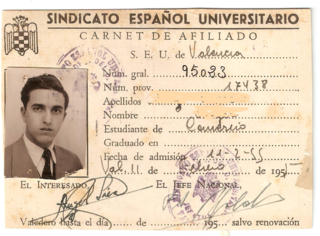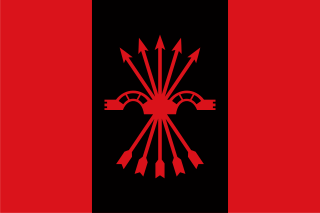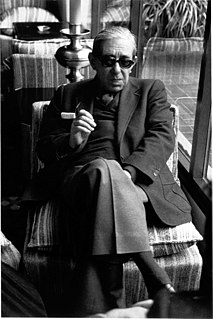 W
WFalangism was the political ideology of two political parties in Spain that were known as the Falange, namely first the Falange Española de las Juntas de Ofensiva Nacional Sindicalista and afterwards the Falange Española Tradicionalista y de las Juntas de Ofensiva Nacional Sindicalista. Falangism has a disputed relationship with fascism as some historians consider the Falange to be a fascist movement based on its fascist leanings during the early years, while others focus on its transformation into an authoritarian conservative movement in Francoist Spain.
 W
W20-N is a symbolic abbreviation used to denote the date of death of two of the best known and controversial figures in 20th-century Spanish history. The first date, 20 November 1936, near the end of the first year of the Spanish Civil War, marks the execution in Alicante of 33-year-old José Antonio Primo de Rivera, the founder of the fascist party, Falange Española, who became extolled as a cult figure during the years of post-civil war Francoist Spain led by Francisco Franco.
 W
WCara al Sol is the anthem of the Falange Española de las JONS. The lyrics were written in December 1935 and are usually credited to the leader of the Falange, José Antonio Primo de Rivera. The music was composed by Juan Tellería and Juan R. Buendia.
 W
WThe Popular Greek Patriotic Union , known more commonly by its acronym, LEPEN (Λ.Ε.Π.ΕΝ.), is a nationalist and far-right political party in Greece.
 W
WThe mottos of Francoism are mottos which encapsulate the ideals of the Francoist dictatorship. Although the regime had many ideological influences, it employed Falangism in its popular movements. Falangist ideology was easily incorporated in the creation of mottos as it is believed to demonstrate a certain reluctance towards political agendas, and to favour empiricism, taking action, and the simplification of ideas.
 W
WMovimiento Nacional was the name given to a governing institution established by General Francisco Franco during the Spanish Civil war in 1937. During Francoist rule in Spain, it purported to be the only channel of participation in Spanish public life. It responded to a doctrine of corporatism in which only so-called "natural entities" could express themselves: families, municipalities and unions. It was abolished in 1977.
 W
WNational Alliance July 18 was a far-right nationalist electoral coalition in Spain, formed ahead of the 1977 elections by New Force of Blas Piñar, Círculos Doctrinales José Antonio and Carlist Traditionalist Communion. July 18 refers to the day on which the Nationalist forces under the leadership of Francisco Franco launched a military uprising in 1936.
 W
WNational Catholicism was part of the ideological identity of Francoism, the political system with which dictator Francisco Franco governed Spain between 1939 and 1975. Its most visible manifestation was the hegemony that the Catholic Church had in all aspects of public and private life. As a symbol of the ideological divisions within Francoism, it can be contrasted to National syndicalism, an essential component of the ideology and political practice of the Falangists.
 W
WRevisionism is a term which emerged in the late 1990s and is applied to a group of pro-Francoist historiographic theories related to the recent history of Spain.
 W
WThe Sección Femenina was the women's branch of the Falange political movement in Spain. Founded in July 1934 as part of the Sindicato Español Universitario (SEU) of the Falange Española de las JONS, and fully incorporated to FE de las JONS later in the year, it remained as part of the FET y de las JONS following the 1937 Unification Decree, subsequently becoming an official institution of the single-party of the Francoist dictatorship. Following General Franco's death and the beginning of the transition to democracy it was disbanded on 1 April 1977 together with all Movimiento Nacional institutions. Sección Femenina was led throughout its history by Pilar Primo de Rivera, the younger sister of Falange Española founder José Antonio Primo de Rivera.
 W
WThe Sindicato Español Universitario was a corporatist students' union in Spain, created in the 1930s during the Second Spanish Republic, by the Falange Española under the leadership of José Antonio Primo de Rivera. The SEU was inspired by students' unions linked to contemporary fascist parties of Italy and Romania.
 W
WThe symbols of Francoism were iconic references to identify the Francoist State in Spain between 1936 and 1975. They serve as visual illustrations for the ideology of Francoist Spain. Uniforms were designed for men and women that combined elements of the earlier Falangist and Carlist uniforms. The state developed new flags and escutcheons based on the traditional heraldry of the monarchy, but now associated with the state. The emblem of five arrows joined by a yoke was also adopted from earlier Spanish symbology, but after 1945 the arrows always pointed upward. This emblem appeared on buildings, plaques and uniforms.
 W
WGonzalo Torrente Ballester was a Spanish writer associated with the Generation of '36 movement.
 W
WThe yoke and arrows or the yoke and the bundle of arrows is a badge dating back to dynastic union of the Catholic monarchs of Spain, Ferdinand II of Aragon and Isabella I of Castile. Subsequent Catholic monarchs continued to use it on their shields to represent a united Spain and as the "symbol of the heroic virtues of the race".
 W
WThe Imperial Order of the Yoke and Arrows was a Spanish state and military order. It was established in 1937 under the dictatorship of Caudillo Francisco Franco and abolished in 1976 following Franco's death and during the Spanish transition to democracy. The order came in five grades.